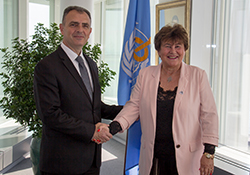Minister of Health of Montenegro visits WHO/Europe

WHO
Dr Kenan Hrapović, Minister of Health of Montenegro, visited WHO/Europe on 6 June 2017 to discuss health priorities and collaboration with the Regional Office. In discussions with Dr Zsuzsanna Jakab, WHO Regional Director for Europe, the Minister outlined developments in the country, including the establishment of a national influenza centre and an accredited laboratory for measles and rubella surveillance; plans to extend the work of the pulmonary hospital to include diagnostic services for tuberculosis and cancer; and plans to set up a national reference library on antimicrobial resistance.
The country is currently undertaking fiscal reforms with the support of the World Bank. Dr Hrapović requested WHO’s guidance and collaboration with the World Bank on fiscal measures that provide effective control of tobacco, alcohol and sugary drinks, and that generate revenues for health programmes.
Health system reform
Montenegro undertook its last health system reform in 2004. The Minister asked Dr Jakab for assistance in evaluating the performance and achievements of the health system over the past 13 years. Dr Jakab offered WHO’s support in assessing health system performance with particular regard to addressing noncommunicable diseases (NCDs) such as cardiovascular diseases and hypertension. The assessment could reveal possible policy directions, and be followed by an open policy dialogue in which relevant stakeholders and sectors at different levels meet with civil society to identify ways forward.
The Minister and Dr Jakab also discussed:
- childhood obesity and Montenegro’s participation in the Childhood Obesity Surveillance Initiative (COSI);
- the establishment of the Regional Health Development Centre on NCDs in Montenegro, set up as part of the South-eastern Europe Health Network (SEEHN);
- a forthcoming high-level consultative meeting for the whole subregion on addressing anti-vaccine lobbies;
- Montenegro’s participation in the WHO small countries initiative; and
- the importance of addressing environmental factors affecting health.
Underlining the importance of intersectoral collaboration and high-level political will, Dr Jakab welcomed Montenegro’s commitment to the 2030 Agenda for Sustainable Development. She expressed her belief that WHO will continue to work closely with the country to ensure that improving health and well-being remains in focus throughout the implementation process.



